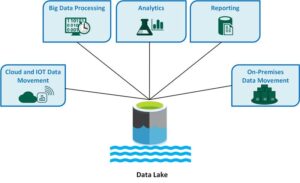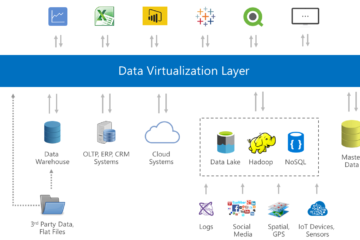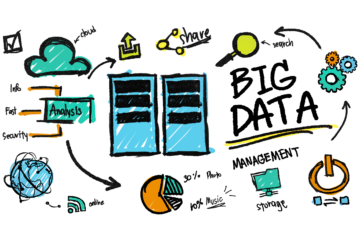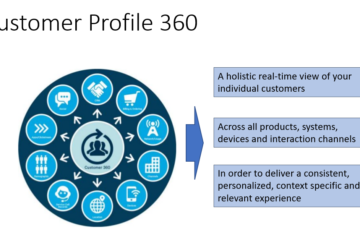Unleashing the Power of Cloud Data Analytics: Transforming Business Decision-Making with Microsoft Azure
Introduction
In today’s rapidly evolving business landscape, data has emerged as a critical asset driving innovation, growth, and competitiveness. To harness the full potential of data, organizations are turning to cloud service providers like Microsoft Azure, which offer robust data analytics and integration tools. These platforms empower businesses to derive actionable insights, optimize processes, and make informed decisions in real-time. This article explores how Microsoft Azure’s data analytics and integration solutions are revolutionizing business decision-making across various industries, with detailed use-cases showcasing their transformative impact.

Image Source: Microsoft
Company: Clear Data Science Limited
1.Retail Industry
1.1 Customer Segmentation and Personalization
- Company: Starbucks
- Use Case: Starbucks leverages Microsoft Azure’s data analytics tools to analyze customer data from various sources, including loyalty programs and mobile apps. By segmenting customers based on their purchase history, preferences, and demographics, Starbucks delivers personalized marketing campaigns, promotions, and product recommendations, enhancing customer engagement and loyalty.
1.2 Inventory Optimization and Demand Forecasting
- Company: Walmart
- Use Case: Walmart utilizes Microsoft Azure’s data analytics capabilities to optimize inventory management and forecast demand. By analyzing historical sales data, seasonal trends, and external factors like weather patterns, Walmart can accurately predict consumer demand, adjust inventory levels accordingly, and minimize stockouts and excess inventory, improving operational efficiency and profitability.
2. Healthcare Industry
2.1 Predictive Analytics for Disease Prevention
- Company: Providence Health & Services
- Use Case: Providence Health & Services leverages Microsoft Azure’s data analytics tools to analyze patient health records, genomic data, and environmental factors to predict disease outbreaks and epidemics. By utilizing machine learning algorithms, Providence can identify high-risk populations, implement preventive measures, and improve public health outcomes, demonstrating the power of data-driven decision-making in healthcare.
2.2 Real-Time Patient Monitoring and Care Coordination
- Company: Johns Hopkins Medicine
- Use Case: Johns Hopkins Medicine utilizes Microsoft Azure’s data integration capabilities to aggregate and analyze patient data from electronic health records (EHRs), wearable devices, and IoT sensors. By integrating data from disparate sources, Johns Hopkins enables real-time patient monitoring, early intervention, and care coordination among healthcare providers, leading to improved patient outcomes and operational efficiency.
3. Manufacturing Industry
3.1 Predictive Maintenance and Equipment Optimization
- Company: BMW
- Use Case: BMW employs Microsoft Azure’s data analytics tools to implement predictive maintenance solutions for its manufacturing facilities. By analyzing sensor data from industrial machinery and equipment, BMW can predict equipment failures, schedule maintenance proactively, and optimize production processes, reducing downtime and maintenance costs while increasing productivity and efficiency.
3.2 Quality Control and Defect Detection
- Company: Bosch
- Use Case: Bosch leverages Microsoft Azure’s data analytics capabilities to automate quality control processes in its manufacturing operations. By using machine learning algorithms to analyze sensor data and images from production lines, Bosch can detect defects, deviations, and anomalies in real-time, ensuring product quality and minimizing rework and waste, thereby enhancing operational efficiency and customer satisfaction.
4. Financial Services Industry
4.1 Fraud Detection and Risk Management
- Company: American Express
- Use Case: American Express utilizes Microsoft Azure’s data analytics tools to detect fraudulent transactions and mitigate risks in real-time. By analyzing transactional data, customer behavior, and external factors, American Express can identify suspicious patterns and anomalies indicative of fraudulent activity, enabling timely intervention and fraud prevention, while maintaining trust and security for customers.
4.2 Regulatory Compliance and Reporting
- Company: HSBC
- Use Case: HSBC leverages Microsoft Azure’s data integration capabilities to streamline regulatory compliance and reporting processes. By integrating data from multiple systems and sources, HSBC ensures data accuracy, consistency, and traceability, enabling timely and accurate regulatory reporting, while reducing compliance risks and operational costs associated with manual processes.
Conclusion
In conclusion, Microsoft Azure’s data analytics and integration tools are empowering businesses across industries to make data-driven decisions, optimize processes, and drive innovation. From retail and healthcare to manufacturing and financial services, organizations are harnessing the power of data to gain actionable insights, improve operational efficiency, and deliver value to customers. As businesses continue to embrace cloud data analytics, the potential for transformative impact on decision-making and performance remains significant, paving the way for a data-driven future of enterprise excellence and growth.


